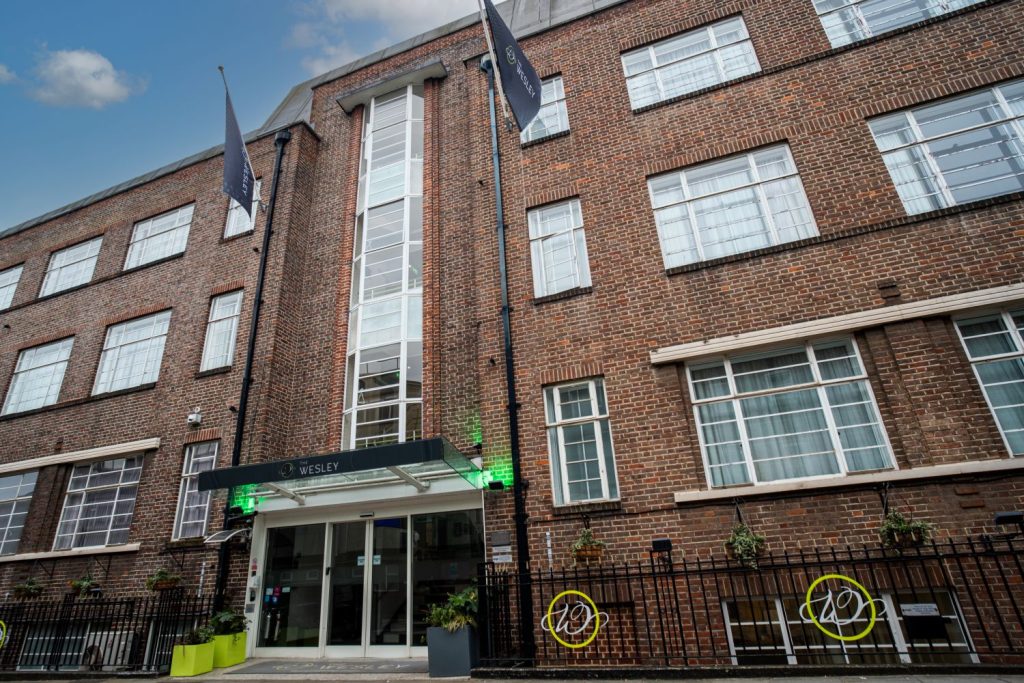Euston may be best known to most Britons as a bustling transport hub where commuters hurry through on their daily journeys, but this central London district harbours a fascinating tapestry of history that extends far beyond its railway connections. From sporting legends to wartime innovation, Euston’s story is one of surprising diversity and cultural significance.
At the heart of this neighbourhood stands The Wesley Euston, a hotel with its own remarkable heritage that mirrors the area’s evolution over decades. As General Manager James Barr explains, this ethical accommodation option has witnessed its fair share of celebrity encounters, with music icons like Oasis, sporting stars including Daniel Dubois and Rio Ferdinand, and notable figures such as former Archbishop Rowan Williams all having passed through its doors.
A Hotel with Purpose
What distinguishes The Wesley from other London hotels is its ethical foundation and fascinating history. The building originally housed the British Non-Ferrous Metals Research Association, established in 1920 to advance the commercial interests of British metal manufacturers. Under director Robert Hutton’s leadership from 1921, the organisation achieved global recognition for its technical research.
During World War II, the building played a crucial role in supporting defence industries, particularly in solving corrosion problems that affected military equipment. This legacy of innovation continues in the hotel’s current operation as the UK’s first ethical hotel, reinvesting profits into charitable work and sustainability initiatives.
The Wesley’s origins can be traced to the vision of Hilda Porter, a Methodist missionary who established the Methodist International House in the 1950s as a welcoming space for students and travellers arriving in post-war London. Named after John Wesley, founder of The Methodist Movement, the hotel embodies principles of service and inclusivity that resonate with travellers seeking accommodation with meaning.
Euston’s Railway Revolution
No exploration of Euston would be complete without acknowledging the revolutionary impact of Euston Station, which transformed London’s connectivity when it opened in 1837 as the capital’s first intercity railway station. The London & Birmingham Railway’s ambitious project, designed by engineering pioneers George and Robert Stephenson, began modestly with just two platforms.
The station’s popularity quickly outgrew its original design, leading to multiple expansions throughout the Victorian era and beyond. The most dramatic transformation occurred in the 1960s, coinciding with the electrification of the West Coast Mainline. Since its 1968 reopening with 18 platforms, Euston has maintained its position as Britain’s busiest inter-city passenger terminal.
Boxing Heritage
Perhaps Euston’s most unexpected claim to fame is its significant contribution to British boxing history. Throughout the early 20th century, the working-class neighbourhoods surrounding Euston and Camden developed a passionate relationship with the sport, producing fighters who trained in church basements and community halls before rising through professional ranks.
This boxing tradition continues today with establishments like Ringtone Boxing Gym on Drummond Street, founded by professional boxer Ben Day. The gym has become something of a local landmark, its walls adorned with boxing memorabilia celebrating the area’s sporting legacy. Current IBF Heavyweight Champion Daniel Dubois is among those who have trained in the Euston area, while the late heavyweight legend Henry Cooper maintained connections to the district through his ownership of Piccolo Café on Euston Street.
The Wesley’s Expansion
The Wesley hotel group has recently expanded its ethical hospitality concept with The Wesley Camden, a 38-room boutique hotel located within Camden Methodist Church. This £11 million conversion project, completed in December 2022, represents a continuation of the group’s commitment to preserving historic buildings while creating modern, sustainable accommodation options.
“From the thunder of steam trains to the echo of gloved fists, Euston’s story is one of transformation and resilience,” reflects James Barr. “At The Wesley Euston Hotel, we’re proud to be a part of the district’s illustrious history.”
For travellers seeking accommodation with both historical significance and ethical credentials, The Wesley offers a distinctive option in an area whose rich heritage extends far beyond its familiar railway platforms.



Leave a Reply